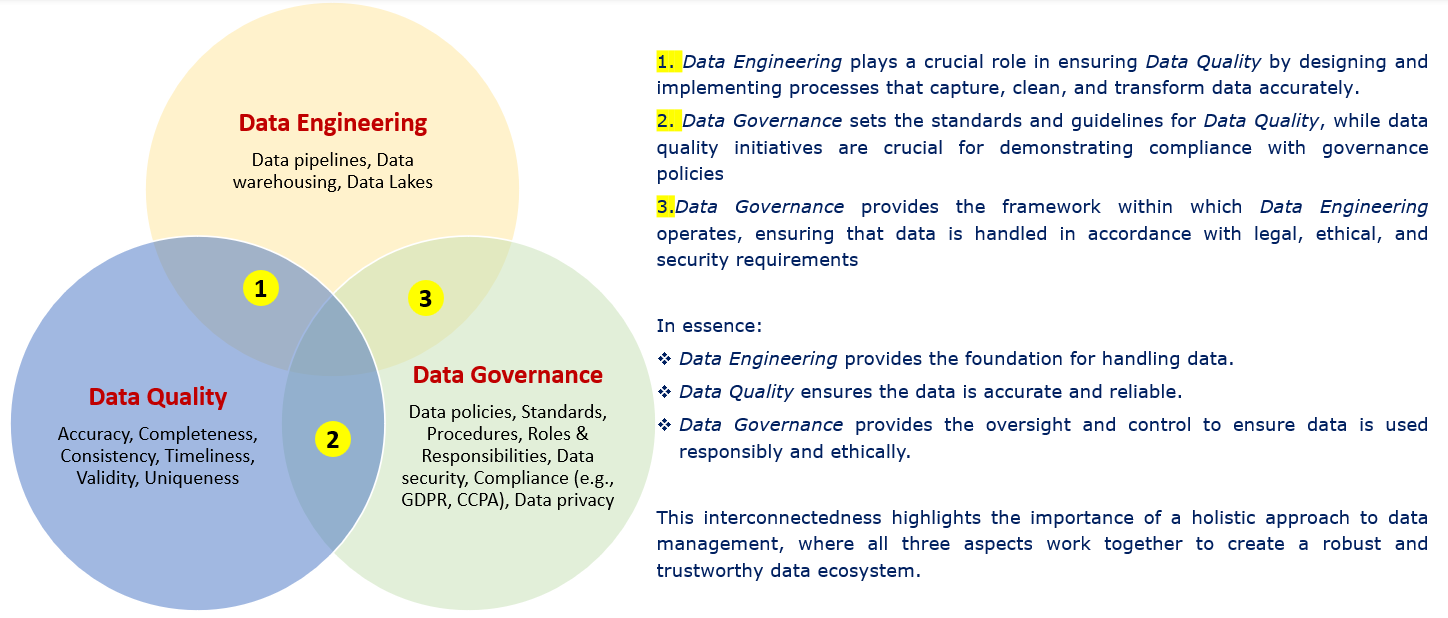

In the rapidly evolving landscape of Artificial Intelligence (AI) and Generative AI (GenAI), data has emerged as the most critical asset driving technological innovation. While AI promises transformative capabilities - from intelligent automation to groundbreaking insights - its true potential is intrinsically linked to the Engineering, Quality and Governance of underlying data ecosystems.
Consider AI as a sophisticated engine and data as its fuel. No matter how advanced the engine, subpar fuel will inevitably compromise performance, lead to systemic failures, and potentially cause catastrophic breakdowns. so, AI and GenAI systems are only as powerful as the data that powers them.
Data engineering is the foundational discipline that transforms raw data into a strategic organizational asset. It goes beyond mere technical implementation, serving as the critical bridge between data collection and AI-driven insights.
Key Responsibilities:
- Scalable Data Pipelines: Designing robust data pipelines that can handle diverse data sources and massive computational loads
- Infrastructure Optimization: Creating flexible architectures that support both real-time streaming and batch processing
- Cloud and Hybrid Integration: Developing solutions that leverage cloud computing while maintaining data accessibility and performance
Data quality is not a luxury but a necessity in the AI era. Compromised data quality can propagate errors, introduce bias, and undermine the most sophisticated AI models.
Critical Quality Dimensions:
- Accuracy and Completeness: Ensuring data represents reality without significant distortions
- Consistency and Standardization: Maintaining uniform data formats across complex organizational ecosystems
- Representativeness: Curating training datasets that reflect diverse perspectives and minimize inherent biases
Data governance provides the regulatory and ethical framework that transforms data from a potential liability into a strategic asset. It encompasses legal compliance, security protocols, and ethical guidelines.
Governance Pillars:
- Regulatory Compliance: Navigating complex data protection landscapes like GDPR, CCPA, and emerging AI regulations
- Ethical AI Development: Implementing transparent mechanisms to audit and mitigate algorithmic biases
- Security and Privacy: Protecting sensitive information through robust access controls and encryption strategies

Successful AI and GenAI implementations require a comprehensive approach that integrates Engineering, Quality, and Governance:
- Invest in scalable, cloud-native data architectures
- Implement advanced data processing frameworks
- Utilize AI-powered data management tools
- Foster data literacy across all organizational levels
- Develop cross-functional data stewardship teams
- Encourage continuous learning and adaptation
- Regularly audit data pipelines and AI model performance
- Implement automated data quality monitoring
- Embrace iterative refinement of data strategies
The convergence of AI technologies presents unprecedented opportunities and challenges. Organizations must remain agile, anticipating:
1. Increasing regulatory scrutiny of AI systems
2. Growing complexity of data ecosystems
3. Rising expectations for ethical and transparent AI
In the AI-driven future, data is more than a resource—it's a strategic differentiator. Organizations that view data engineering, quality, and governance as core competencies will not just survive but thrive in an increasingly intelligent digital landscape.
The path forward is clear: Invest comprehensively in data foundations, and let innovation flourish on a bedrock of integrity, efficiency, and trust.
.png)

